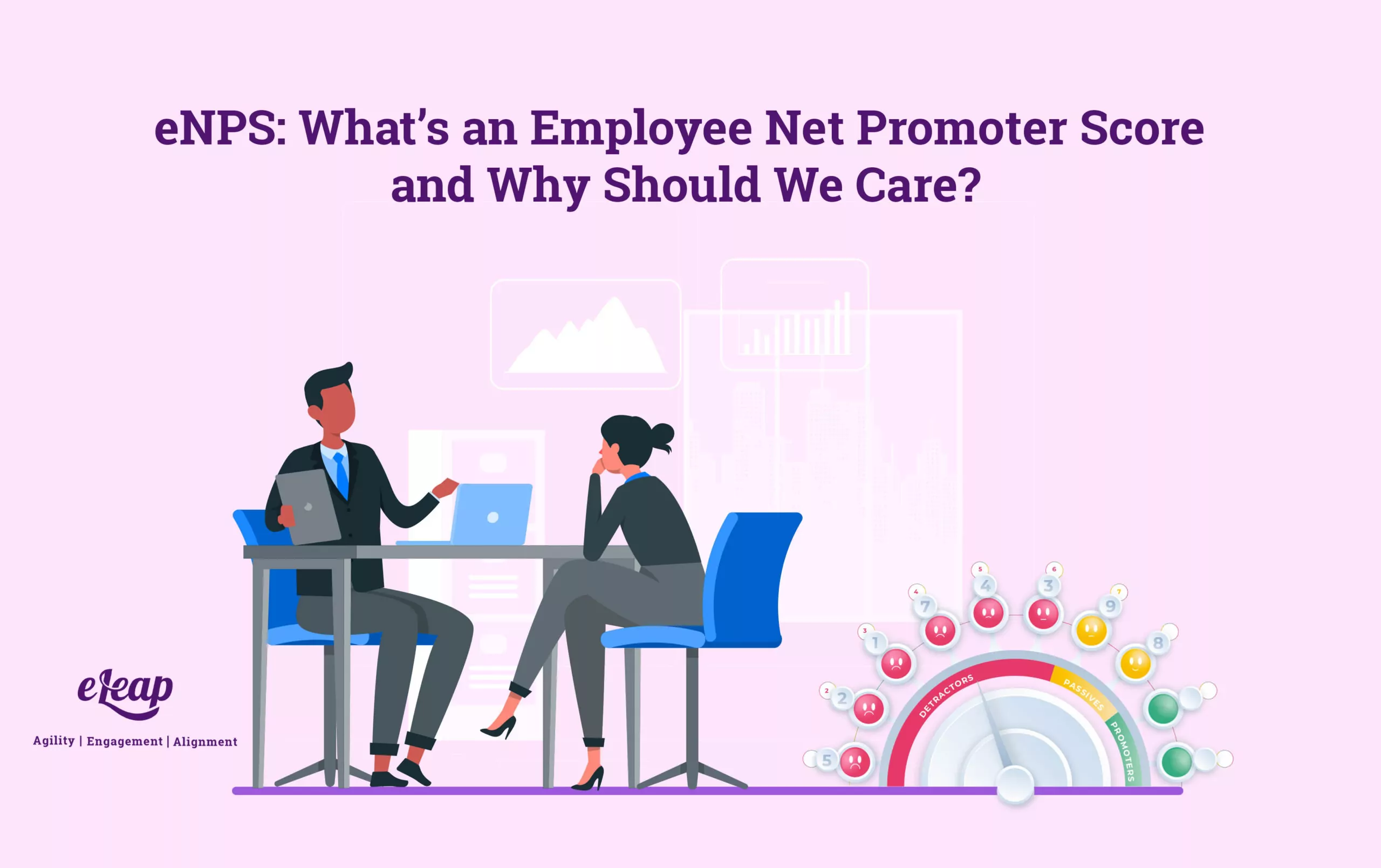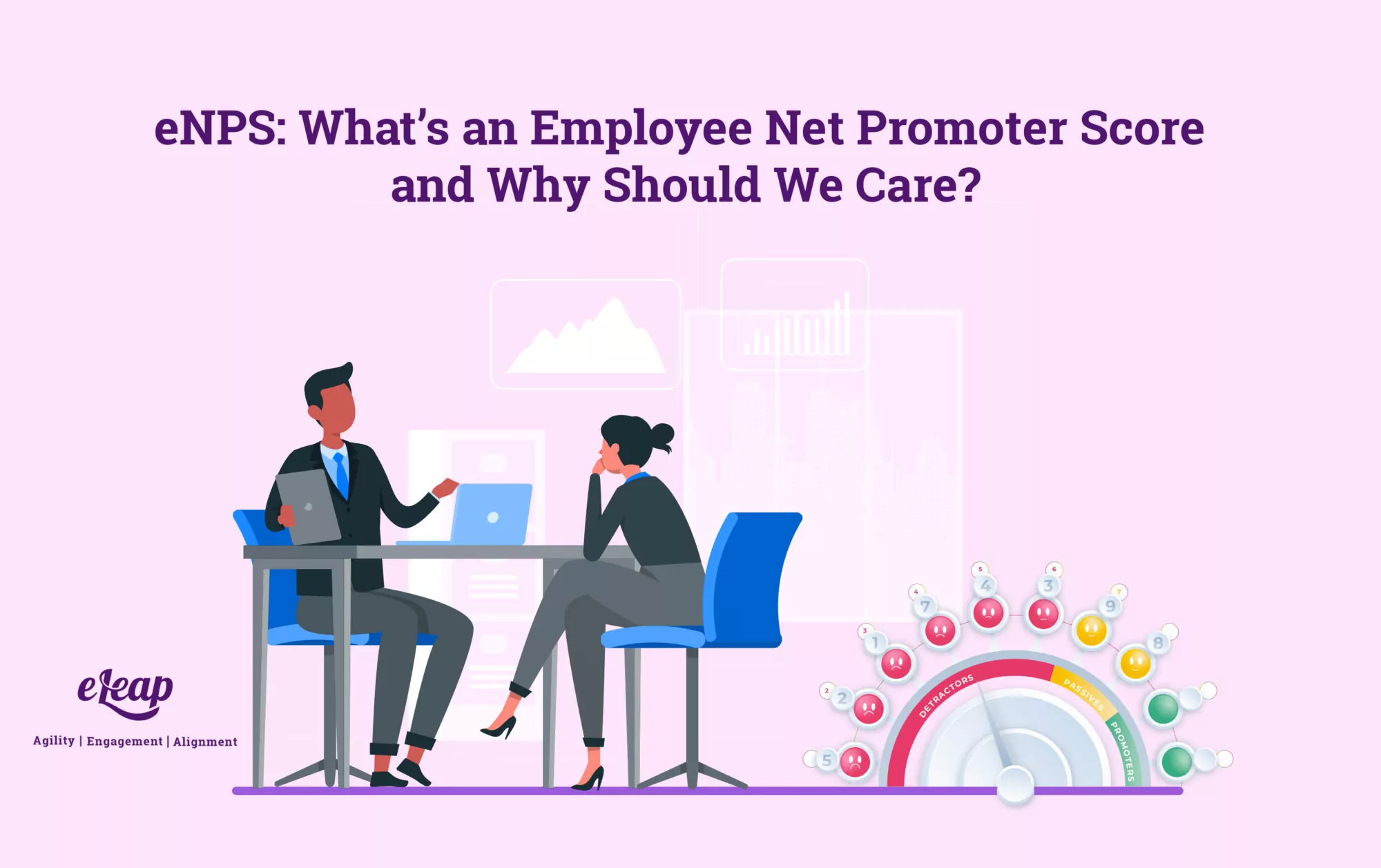eNPS: What’s an Employee Net Promoter Score and Why Should We Care?

The Employee Net Promoter Score (eNPS) is a metric designed to evaluate and measure employee loyalty and satisfaction in an organization. It is a variation of the Net Promoter Score (NPS), a widely known tool for measuring customer loyalty. Employee Net Promoter Score revolves around a single, straightforward query: “On a scale from 0 to 10, how likely are you to endorse your organization as an ideal place to work to your friend or coworker?” Explore how eLeaP®’s Performance Management Platform can simplify evaluations, boost productivity, and drive measurable results.
The Power of Employee Net Promoter Score (eNPS) relies on employee satisfaction
In today’s fast-paced professional landscape, the symmetry of success pivots on more than just achievement and customer satisfaction. The well-being, ease, and loyalty of your employees have become top. The recognition that a happy staff is the backbone of a flourishing company is propelling organizations to seek groundbreaking ways to measure and improve employee satisfaction. Enter the Employee Net Promoter Score (eNPS), a transformative metric that succinctly captures the essence of employee emotion and loyalty. In this article, we will attempt to delve into the background and use case of the Employee Net Promoter Score and underscore why it should be a cornerstone of your corporate strategy.

Categories of Employee Net Promoter Score
Employees give a numerical rating, which is later grouped into one of three classes:
Promoters (Scores 9-10): These are the keen, loyal promoters of your company. They are not only content but are also enthusiastic to refer others to join the organization. Their score can be 9 or 10.
Passives (Scores 7-8): These employees are satisfied, but they may not be entirely involved or devoted, making them vulnerable to discovering other opportunities. Their score can be 7 or 8.
Detractors (Scores 0-6): These detractors are dissatisfied employees who face the risk of moving from the organization and might share negative experiences within their circle. Their score lies between 0 to 6.
The Employee Net Promoter Score is calculated based on the formula by subtracting the percentage of detractors from the percentage of promoters, which results in a score that falls within the range of -100 to 100.
Why Employee Net Promoter Score Deserves Your Attention:
One of the most compelling reasons to pay attention to eNPS is its robust connection to member engagement. The working or involved employees tend to be more dynamic, devoted, and loyal. By understanding your Employee Net Promoter Score, you gain interest in areas that require attention and can take planned actions to boost engagement, leading to a more enthused and committed workforce.
It has gained importance for several reasons:
Employee Net Promoter Score is very simple. The single-question layout is easy to understand by reducing the load of lengthy surveys.
eNPS allows prompt action by providing real-time insights into employee sentiments. It is very quick and can be conducted frequently.
eNPS is employee-centric, by ensuring that their satisfaction plays a vital role in the success of your business.
Employee Net Promoter Score allows you to benchmark your organization’s reputation against industry norms and competitors.
Employee Net Promoter Score vs Employee Engagement
A high eNPS is representative of a flourishing organizational culture. When employees are happy with their workplace, their enthusiasm to recommend the firm shines through. A healthy Employee Net Promoter Score doesn’t just benefit your current staff; it also flips your company into a magnet for top talent in the job market, as they keenly seek obtainable organizations that stand in a positive atmosphere.
Enhancing overall performance, eNPS serves as a key indicator of employee engagement, highlighting promoters with high eNPS scores.
By accepting the degrees of passive views, strategies can be created to further increase their engagement.
By addressing and highlighting the concerns of red-flagged detractors, their engagement can be improved.
Regular Employee Net Promoter Score surveys can provide feedback loops to facilitate communication.
eNPS engagement can also be enhanced by targeting the specific areas that require special attention, like leadership, communication, work-life balance, etc. Rewards and Recognition can further boost engagement.
Crafting a Positive Organizational Culture
A thriving company culture is built on successful organizations. A high Employee Net Promoter Score indicates a positive organizational culture.
Promoters keenly promote the firm culture both inside and outside the organization. Their support appeals to like-minded talent and highlights a culture of positivity.
eNPS data can expose the features of your company culture that boom with employees and those that may need modification.
A strong Employee Net Promoter Score can be an attraction for top talent. Potential employees actively pursue organizations with a positive culture. A high eNPS score groups your company in a competitive job market.
The following points can be considered to maintain and cultivate a positive company culture:
By conducting Employee Net Promoter Score assessments at regular intervals to monitor changes in your company culture and to alter strategies accordingly.
Ensure that your organizational standards are reflected in your company culture
Encourage honest and open communication within the organization
eNPS is not just a static metric as a whole; it also functions as an early warning system, by warning organizations of impending issues before they convert into major problems such as :
- A falling Employee Net Promoter Score is a clear signal of a rise in dissatisfaction within the workforce. Solving this trend proactively can avoid employee discontent and turnover.
- Pinpointing certain concerned areas can enable organizations to handle issues before they get worse.
Employee Net Promoter Score vs Talented Recruitment
A talented hire can be a game-changer for strong eNPS. Passive and Promoters are more likely to mention your organization as a place to work. Different recommendations can appeal to top talent. In a modest job market, a more eNPS score distinguishes your organization as an ideal employer, tempting talented individuals who pursue a positive work environment.
Candidates are progressively conducting due diligence by looking for insights from former or current employees. A high Employee Net Promoter Score can affect their decision to join your organization.
Join the power of Employee Net Promoter Score to strengthen your recruitment efforts:
To highlight employee satisfaction points, display your eNPS score and recruitment material on your career site.
Reassure employees to provide recommendations and share their practices about working at your organization. These reliable narratives can boost prospective candidates.
Influence social media and employer marketing to showcase an optimistic work culture, representing that your eNPS score is not just a number but a result of the employee experience.
How to use Technology for eNPS tracking
Today, knowing the formula to calculate your eNPS is handy, but it isn’t essential. Thanks to modern tech and automation tools like eLeaP PMP, you can track your surveys and collect valuable feedback, data insights, and score your employee NPS with just a few clicks. You can even filter the results based on various attributes, including departments, demographics, managerial teams, and so forth
eNPS is a data-driven method, and it’s not just a metric for employee loyalty and satisfaction. Consistent monitoring enables organizations to measure the effect of their creativity aimed at enhancing employee satisfaction.
Employee Net Promoter Score data allows companies to make decisions and plan choices that lead to consistent improvement. Continuous feedback encourages them to share their ideas and develops an environment of transparency and trust.
Continuous Improvement through Employee Net Promoter Score
eNPS as a catalyst for ongoing enhancement:
- An in-depth analysis can be conducted to identify the root cause of problems exposed by Employee Net Promoter Score data.
- Keenly involve employee feedback in decision-making processes and drive changes that reproduce the workforce’s preferences and needs.
- Join the results of eNPS surveys and the arrangements taken in response to employee feedback, supporting trust and transparency.
Conclusion
In a world where appealing and retaining top talent is vital, and a positive firm culture is a viable advantage, the Employee Net Promoter Score (eNPS) has appeared as a crucial tool for progressive organizations. eNPS not only deals with employee satisfaction but also helps as a promoter for employee engagement, an indicator for company culture, an initial warning system, and a recruitment magnet. It’s an active, data-driven approach to raising a culture of brilliance, and it’s evidence of your promise to your employees’ well-being and your organization’s achievement. So, if you are devoted to improving your workplace environment, attracting and retaining your upper talent, and maintaining a modest edge in the job market, it’s time to give the Employee Net Promoter Score the consideration it deserves. Your employees, your future, and your bottom line will certainly reflect the effect of your asset.